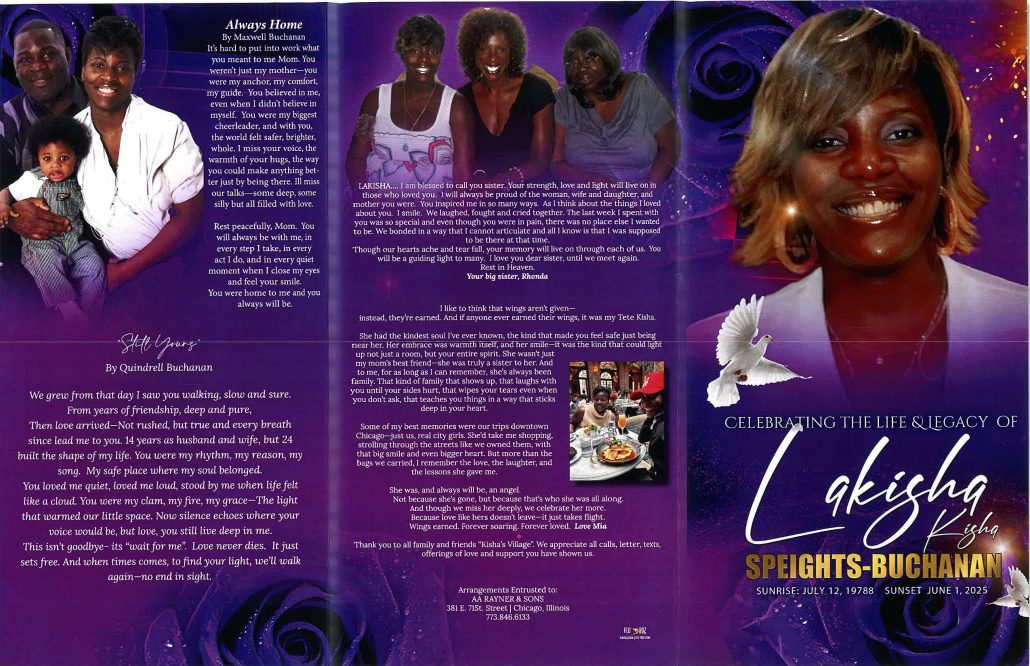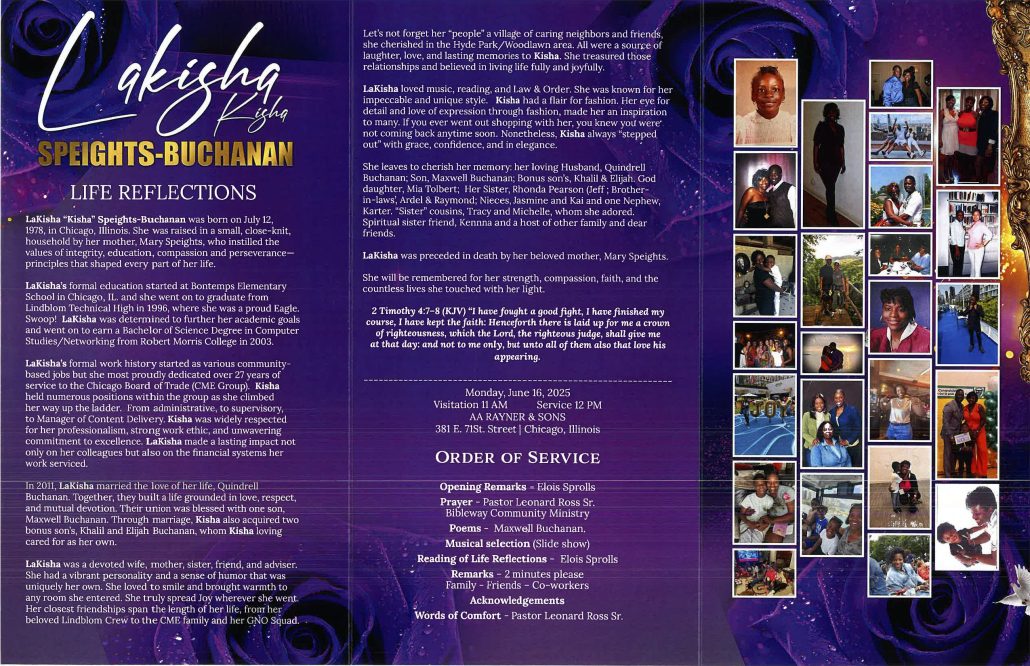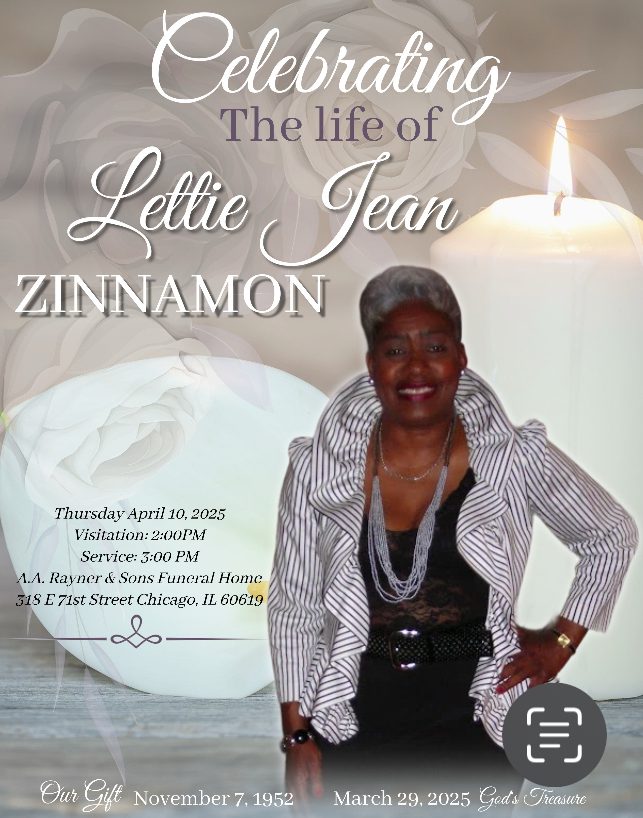AA Rayner Interview with PBS Chicago
/in BlogWYCC PBS Chicago brings an in-depth look into the challenges of repeat gun offenders, ways to fight crime, and how communities are working to keep people safe. After a sickening spike in violence that included more than 4,000 shootings and 760 homicides last year, legislation to get tough on gun felons is pending at the state capitol. But whether a crackdown on repeat offenders is the right way to fight crime remains a matter of fierce debate. Joining host Chris Bury to discuss the push for tougher gun offender laws are Chicago, Illinois 15th Ward Alderman Raymond Lopez, Stephanie Kollmann, Policy Director of the Children and Family Justice Center at Northwestern University-Northwestern Law and Shibani Mahtani, crime reporter for The Wall Street Journal.
Exploring Funeral Pre-Planning Options: Securely Mapping Your Final Wishes
/in Blog, News, ResourcesFuneral pre-planning is a proactive step that allows you to make essential decisions about your end-of-life arrangements in advance. By taking control of your funeral plans, you alleviate the burden on your loved ones during an emotionally challenging time. In this comprehensive guide, we will delve into the various funeral pre-planning options available, empowering you to ensure that your final wishes are honored with care and precision.
Understanding Funeral Pre-Planning
Funeral pre-planning is about making decisions in advance about your funeral service, burial or cremation preferences, and related details. This helps relieve stress for your family since they won’t have to make tough decisions during their grieving period.
Financial Security: Pre-planning allows you to lock in current prices, potentially saving your family from future cost increases.
Personalization: You have the opportunity to customize every aspect of your funeral, ensuring it reflects your personality, beliefs, and values.
Funeral Pre-Planning Options
1. Pre-Paid Funeral Plans: These plans involve arranging and paying for your funeral in advance. Funds are typically placed in a trust or insurance policy, ensuring that the money is available to cover your funeral expenses when the time comes.
2. Funeral Insurance: Also known as burial or final expense insurance, this type of policy provides a designated payout to cover funeral costs. It’s a flexible option that offers financial support to your beneficiaries.
3. Online Funeral Planning Tools: Several online platforms offer tools that guide you through the pre-planning process. You can document your preferences, wishes, and even leave messages for your loved ones.
Steps to Effective Funeral Pre-Planning
1. Research and Compare: Take time to research various pre-planning options and compare their features, benefits, and costs. Make sure you understand the terms and conditions associated with each choice.
2. Consult a Professional: Consider consulting a funeral director or financial advisor to gain insights into the pre-planning process. They can provide expert guidance tailored to your individual circumstances.
3. Document Your Wishes: Clearly outline your funeral preferences, including burial or cremation, type of service, music, readings, and any personal touches you desire.
4. Communicate With Family: Inform your family and loved ones about your pre-planning decisions. Provide them with access to the relevant documents, so they know your wishes are recorded.
Flexibility and Changes
It’s important to recognize that life circumstances can change over time. Fortunately, many pre-planning options offer flexibility.
Updating Plans: You can typically update or modify your pre-planned arrangements to align with any changes in your preferences or circumstances.
Transferring Plans: Some pre-paid funeral plans can be transferred to another funeral home if you relocate or have a change of heart.
Legal Considerations
When engaging in funeral pre-planning, be aware of the legal aspects involved:
Will and Testament: Ensure that your pre-planning choices are also reflected in your will to avoid confusion or conflicts.
Designated Beneficiary: If you opt for funeral insurance, clearly designate the beneficiary who will receive the payout to cover your funeral costs.
Final Thoughts
Funeral pre-planning is a thoughtful and considerate way to alleviate the emotional and financial burden on your loved ones. By exploring various options and making informed decisions, you can rest assured that your final wishes will be honored, and your family will be well-supported during a difficult time.
In a world where uncertainty is inevitable, pre-planning provides a sense of control and peace of mind, allowing you to create a meaningful farewell that reflects your life, values, and legacy.
Unveiling the Cremation Process: A Comprehensive Overview
/in Blog, ResourcesUnveiling the Cremation Process: A Comprehensive Overview
Cremations have been increasing in popularity over the years. It’s important to understand the cremation process to make informed decisions during end-of-life planning. Lets take a detailed look at what happens during a cremation, shedding light on the steps involved, the environmental impact, and how to personalize this choice to reflect the individual’s life and wishes.
Cremation Process
Preparation of the Body: Before the actual cremation takes place, any personal belongings, such as jewelry or prosthetics, are removed. Medical devices, such as pacemakers, are also taken out, as they can pose a danger during the cremation process.
Placing the Body in the Cremation Chamber: The body is then placed in a cremation chamber, also known as a retort or cremator. The chamber is preheated to a high temperature, usually between 1,400 and 1,800 degrees Fahrenheit.
The actual cremation process begins as the body is exposed to intense heat and flames. This process reduces the body to its basic elements, primarily bone fragments and ashes, through a combination of high temperature and vaporization.
Cooling and Processing: Once the cremation is complete, the remains are allowed to cool for a period before being processed further. The bone fragments are then carefully removed from the chamber and processed into a finer consistency.
The processed remains or “ashes,” are placed in a container, typically an urn, which can be chosen by the family. The container is then returned to the family for safekeeping, burial, scattering, or other arrangements.
Personalizing the Cremation Process
Cremation offers opportunities for personalization, allowing family and friends to create a unique and meaningful farewell:
Memorial Services: A memorial service can be held before or after the cremation, offering a chance for loved ones to gather, share memories, and pay their respects.
Scattering Ceremonies: The ashes can be scattered in a location that held significance for the departed. This can be a natural setting, the sea, or another meaningful place.
Keepsakes and Jewelry: Ashes can be incorporated into memorial jewelry or keepsakes, allowing loved ones to carry a tangible reminder.
Urn Selection: Urns come in a wide variety of styles and materials, enabling you to choose one that reflects the individual’s personality and preferences.
Understanding what happens during a cremation is essential for making well-informed decisions when planning end-of-life arrangements. The process involves careful preparation, controlled temperature exposure, and respectful handling of the remains.
The Average Cost of a Funeral: Understanding the Financial Burden of Saying Goodby
/in Blog, News, ResourcesWhen the time comes to bid farewell to a loved one, planning a funeral can be an emotionally challenging and financially burdensome task. Understanding the average cost of a funeral is essential for making informed decisions and managing expenses during this difficult period. In this article, we will delve into the various factors that contribute to the overall cost of a funeral, explore ways to mitigate expenses, and discuss the importance of pre-planning to ease the financial burden on grieving families.
The Components of Funeral Costs
A funeral is composed of several essential components, each contributing to the final cost. These components can be categorized into the following:
1. Funeral Home Services: The funeral home’s services often form the core of the overall expenses. These services include preparing the body, coordinating the funeral ceremony, providing staff for the event, and offering facilities for visitation or memorial services.
2. Casket or Urn: The cost of the casket or urn can significantly impact the total expense. Funeral homes offer a wide range of options, from simple to elaborate, with varying price tags.
3. Embalming and Body Preparation: If the family chooses to have an open-casket ceremony or a viewing, embalming and body preparation costs will be included.
4. Funeral Ceremony: The cost of holding a funeral ceremony at a place of worship, a funeral home, or a graveside service should be considered.
5. Transportation: Expenses related to transporting the deceased, including a hearse, limousine, or other vehicles, are included in funeral costs.
6. Gravesite and Cemetery Expenses: This includes the purchase of a burial plot, the opening and closing of the grave, and any associated fees.
7. Headstone or Grave Marker: The cost of a headstone or grave marker is an additional expense that may be included in the overall funeral cost.
Understanding the Average Cost
The average cost of a funeral can vary significantly depending on various factors, such as geographic location, the chosen funeral home, and the specific services and products selected. According to the National Funeral Directors Association (NFDA), the median cost of a funeral in the United States was around $7,640 in 2019. However, this figure is subject to change over time and may have increased since then as inflation is always a factor.
Factors Affecting Funeral Costs
Several factors contribute to the variation in funeral expenses:
1. Location: Funeral costs can vary by region, city, and even neighborhood. Generally, urban areas tend to have higher expenses compared to rural areas.
2. Type of Funeral Service: The type of funeral service chosen by the family plays a crucial role in determining the cost. A traditional full-service funeral with a visitation, ceremony, and burial is likely to be more expensive than a direct cremation or a simple memorial service.
3. Choice of Casket or Urn: The price of caskets and urns can vary widely, from a few hundred dollars to several thousand, depending on the material, design, and craftsmanship.
4. Embalming and Body Preparation: Opting for embalming or additional body preparation will add to the overall cost.
5. Cemetery Fees: Costs associated with the cemetery plot, grave opening and closing, and perpetual care fees will impact the total expenses.
6. Additional Services and Products: Flowers, obituary notices, memorial printing, and catering services are among the additional expenses that should be considered.
Managing Funeral Expenses
While dealing with the loss of a loved one, managing funeral expenses can add to the stress and emotional burden. However, there are ways to make this process more manageable:
1. Comparing Funeral Homes: It’s essential to research and compare the prices and services offered by different funeral homes. Request itemized price lists to understand the breakdown of expenses.
2. Consider Direct Cremation or Burial: Direct cremation or burial is typically more cost-effective than traditional funerals, as it eliminates certain services like embalming and viewing.
3. Opt for Cremation: Cremation costs are generally lower than traditional burials, as they do not involve purchasing a burial plot or headstone.
4. Choose a Simple Casket or Urn: Funeral homes offer a wide range of casket and urn options. Opting for a simpler design can significantly reduce costs without compromising on the dignity of the farewell.
5. Pre-Plan the Funeral: Pre-planning allows individuals to make funeral arrangements in advance, locking in current prices and sparing loved ones from unexpected financial burdens.
6. Consider Green or Natural Burial: Green burial options are eco-friendly and can be more cost-effective, involving simpler caskets or shrouds and burial in natural settings.
The Importance of Pre-Planning
Pre-planning a funeral can significantly alleviate the financial stress faced by grieving families. By discussing and documenting their preferences in advance, individuals can ensure that their funeral arrangements align with their wishes while locking in current prices and avoiding potential future cost increases. Pre-planning also allows families to focus on the grieving process rather than on navigating complex and time-sensitive decisions.
Conclusion
The average cost of a funeral can vary based on numerous factors, and it’s essential to be aware of the expenses involved in saying a final farewell to a loved one. By understanding the components that contribute to the overall cost and exploring ways to manage expenses, families can navigate the financial aspects of funeral planning more effectively. Pre-planning remains a valuable option to ease the burden on loved ones, ensuring that the focus remains on cherishing memories and celebrating the life of the departed.
Please contact us and we can discuss your needs in person or over the phone.
Happy Birthday Ahmed Rayner III
/in Blog, ObituariesTo our Father

To say our father was a good man would be an understatement. He was an amazing man who always put others first. We never once saw him lose his temper or say an unkind word to anyone. He was always patient and kind, even when dealing with the most difficult people. We are so proud to be his children. He was always fair and honest with everyone he met. He was a hard worker, and he instilled those values in us. We will always remember him for his kind heart and his endless supply of love. We miss you dearly, Dad! Happy 70th birthday and 10 years of heavenly peace. (Trey, A.A.Rayner III)
We love you, your children Ahmed IV & Tracy
My Brother
We miss you, Trey. On this day , July 24 1923, we commemorate what would have been your 70th birthday. We all remember and miss your infectious laugh, your amazing sense of humor, and your knowledge of all things from the serious or the mundane. You are still here among us with the memories you have left us through your family, friends, and the work you did. If you were here, you would smile and be proud to see your children and grandchildren as part of the Rayner Funeral Home legacy. Though we have lost your physical presence, your spirit will always remain within us until the time when we will see you and our beloved ancestors again.
Thanks, Trey, for being part of our lives. We love and miss you. Happy birthday.
Deucey
Born in Chicago on July 24, 1953, Rayner died at home on his birthday, July 24, 2013, after just being released from the University of Chicago Hospital where he was being treated for a GI problem, according to his brother, Dr. Loris Rayner. “When he came home from the hospital, he was stable,” he said, confirming that his brother died unexpectedly at his South Side home.
“It is ironic, Dr. Rayner said, “because my brother died on his birthday and our mother, Alice Rayner, passed on July 30, 2012, almost a year to the day….”
Rayner was the son of the late Ahmed (A.A. Sammy”” Rayner, the founder of A.A. Rayner & Sons. His father was AA. Rayner, Sr., who founded the funeral home in 1947.
Like the other Rayner children, Mr. Rayner attended Holy Angels School but graduated from St. Columbanus School. He attended Leo High School, Malcolm X College, and he graduated from the Worsham School of Mortuary Science. Mr. Rayner was a mortician for more than 30 years and a man who loved his profession, according to Dr. Rayner.
“Between the two funeral homes, my brother touched so many people whom he trained in the profession, touched so many people with jobs, touched so many people with his wonderful spirit. He touched a lot of people. He was always helping people just like his father,” said Dr. Loris Rayner.
“He always had a story. He was always talkative and always willing to give himself to others.” “He loved the funeral business, and it showed in the work he did and the way he worked,” said Dr. Rayner.
Today marks 10 years!
Dad, you are one of my divine will and purpose, I am well covered by your soul, and you give me strength to live and do what I do every day! So today, I honor you and thank you for choosing me to be your first and only daughter! Forever, I will miss and love you!! Rest Peacefully, My Loving Daddy!
❤ Happy 70th Birthday , Happy Commemorative Day!!
Tracy
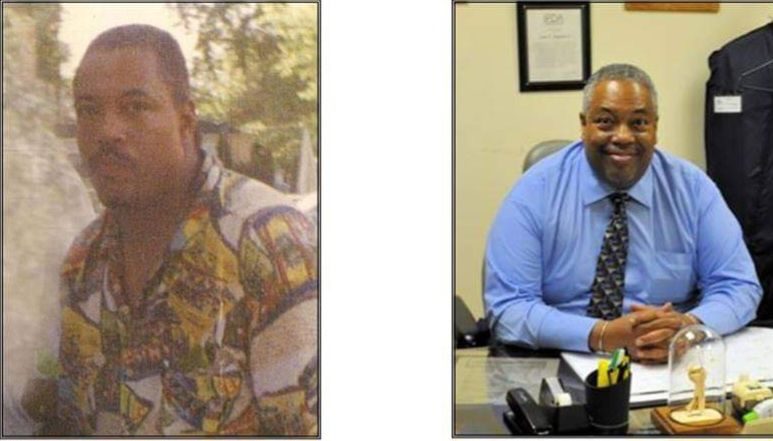
Grief, Healing, and Honoring Your Loved One
/in Blog, Grief Support, ResourcesGrief is a complex emotion to deal with and there are no exact steps to guide you on this journey. It is important to remember that grief looks different for each person, and the best way to cope with it is by finding the path which feels most comfortable for you. Here are some tips from AA Rayner and Sons Funeral Homes that can help you navigate your grief journey while honoring your loved one.
Give Yourself Time
It is important not to rush into anything while in the midst of mourning your loved one. Take time every day to process your feelings; this will allow you time and space to work through them on your own terms. Whether that means journaling, talking with friends or family, or just taking a moment for yourself, it all can help in the healing process.
Be with Friends and Family
Grieving can feel like a lonely journey, but the presence of understanding and supportive people can make a significant difference. It’s important to spend quality time with those who can empathize with your experiences, whether it’s virtual or in person. These people can offer comfort and be a source of solace during this challenging time.
Participate in Rituals or Spiritual Practices
Spirituality can bring comfort and peace during difficult times of grief. Incorporating practices like prayer or meditation can help open our hearts and minds to healing energies from within ourselves and the universe. Adding these practices to our daily routine can be a powerful tool for coping with loss.
Participate in a Grief Support Group
Joining a grief support group can be a powerful experience. Sharing stories and connecting with others who understand your pain can help you process your emotions in a welcoming and non-judgmental environment. This support system can provide valuable insights into managing feelings of loss and celebrating the life of loved ones.
Writing Down Memories
Writing down memories of a loved one is a powerful and meaningful way to honor their memory while also processing your own grief. It allows you to capture those special moments and keep them close, preserving them for future reflection. By writing down these memories, you can keep the memory of your loved one alive and ultimately find comfort and healing in the process.
Consult a Therapist
If you’re struggling with tough emotions such as grief, sadness, or anxiety, seeking professional advice is always a good practice. Especially if the emotions are severe, a therapist can help you come up with specific coping techniques tailored to your needs. Their invaluable guidance throughout the grieving process could lead to quicker healing over time than trying to navigate through it alone.
Memorializing with a Bronze Plaque
When you lose a loved one, it’s natural to feel a wide range of emotions as you come across things that are closely associated with them. These can be places, objects, or simple gestures that remind you of their presence in your life. By marking these spots with bronze plaques or other memorials, we create a tangible reminder of the love and memories that continue to linger on. Check it out for more info on how to create lasting memorials for those special people in your life.
The grieving process is unique to each person, and there is no “right” or “wrong” way to cope with loss. It is crucial to find what works best for you when mourning a loved one. You can honor their memory by taking some time every day to reflect, either alone or with loved ones who understand what you are going through. Marking special spots or items with a bronze plaque can also help ease some pain and bring forth remembrance and celebration.
For compassionate funeral, cremation, and memorial services in Chicago, visit AA Rayner and Sons Funeral Homes today.
Local 134 Interviews AA Rayner and Sons about working relations in the Chicago community
/in Blog, NewsThe Daily Life of the Tuskegee Airmen: The Lieutenant Rayner Collection by The National Air and Space Museum
/in Blog, NewsIn 1982, the National Air and Space Museum opened the exhibit Black Wings: The American Black in Aviation and the companion book was published the next year. The exhibit relied heavily on donations of historical photographs, including a set of black and white copy US Army Air Force photographic negatives donated by Ahmed A. “Sammy” Rayner, Jr. These images, paired with Rayner’s remembrances of his time as a Tuskegee Airman, provide vivid examples of the daily lives of the 477th Bombardment Group and their training activities in the United States. His experiences as a Black officer and pilot later fueled his postwar political activity.
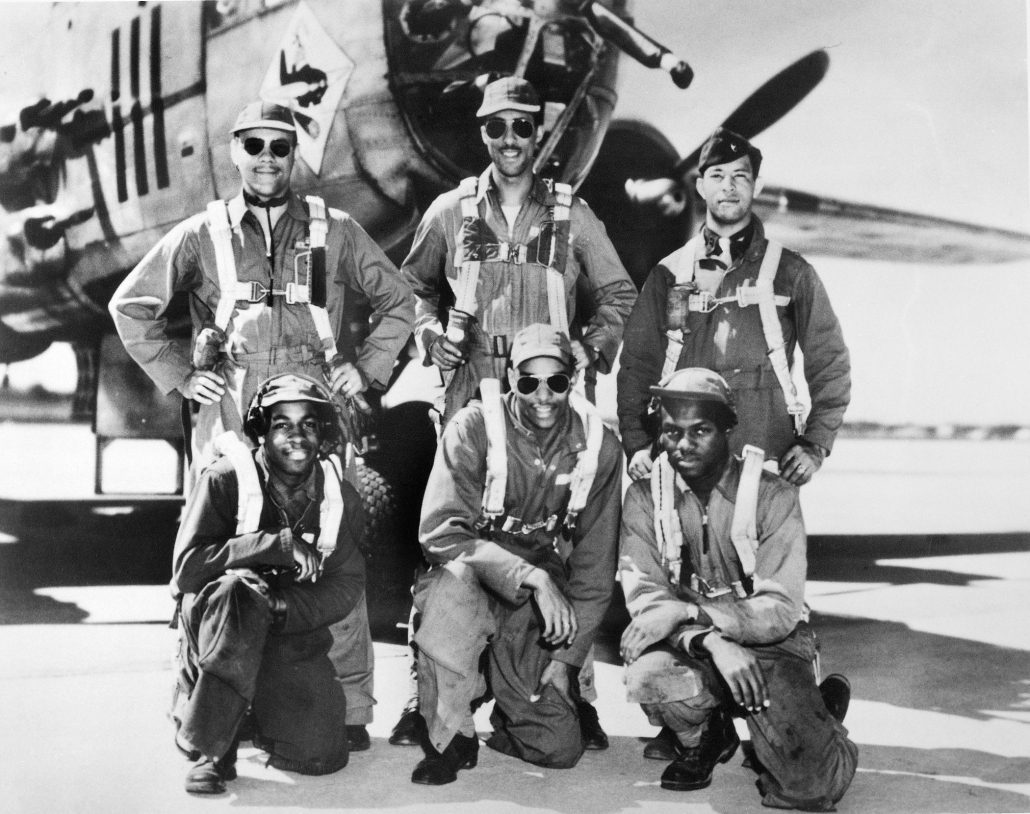
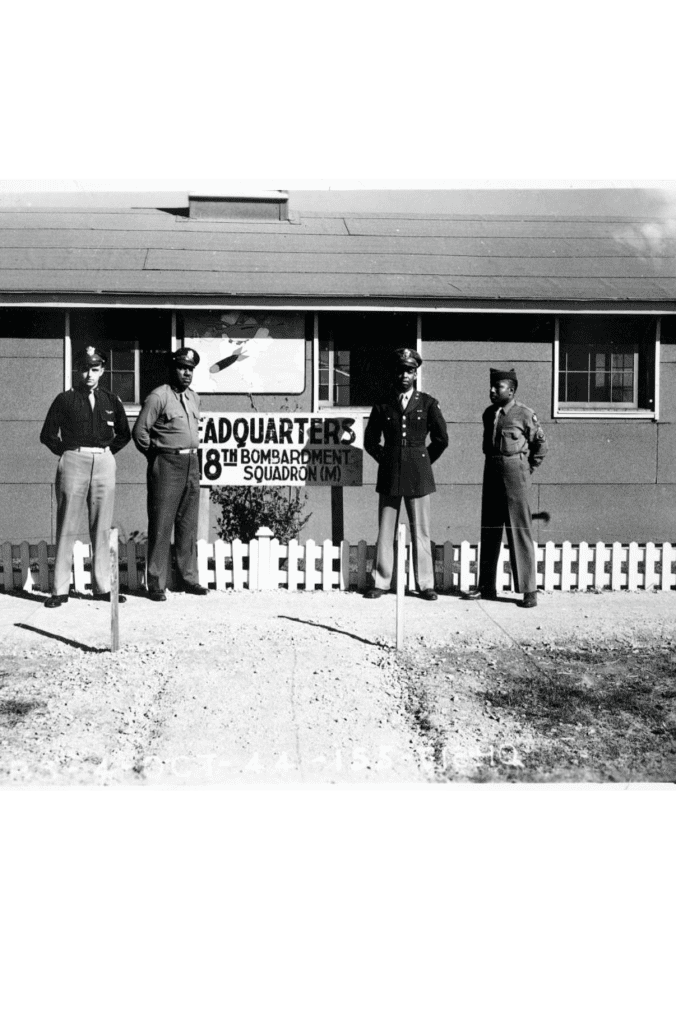
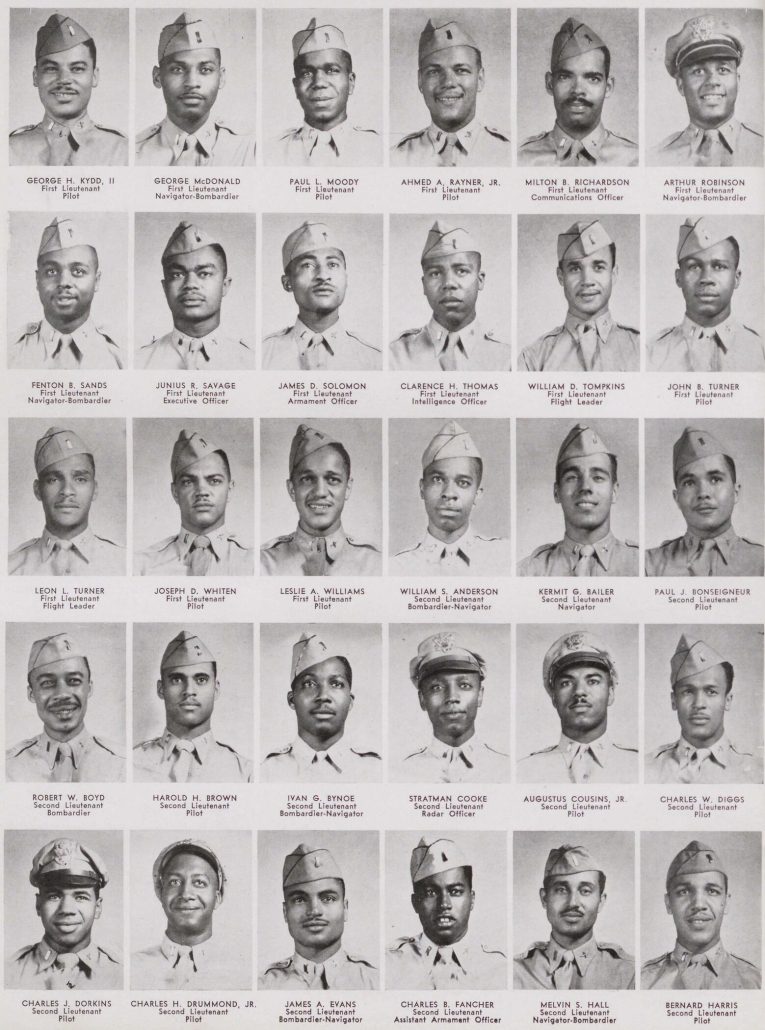
You can read the entire article Here
South Side Location
West Side Location
Funeral Services
Search
 Maurice Jones ObituaryJune 26, 2025 - 11:15 am
Maurice Jones ObituaryJune 26, 2025 - 11:15 am Harriet E Reed ObituaryJune 24, 2025 - 12:08 pm
Harriet E Reed ObituaryJune 24, 2025 - 12:08 pm Joe Barr ObituaryJune 21, 2025 - 3:21 pm
Joe Barr ObituaryJune 21, 2025 - 3:21 pm

